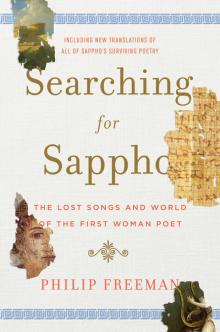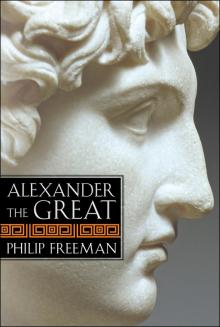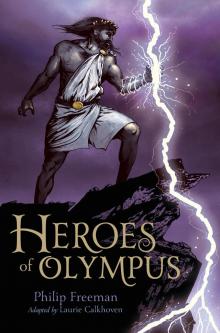- Home
- Philip Freeman
Alexander the Great
Alexander the Great Read online
ALSO BY PHILIP FREEMAN
Julius Caesar
The Philosopher and the Druids: A Journey Among the Ancient Celts
St. Patrick of Ireland: A Biography
War, Women, and Druids: Eyewitness Reports and Early
Accounts of the Ancient Celts
The Galatian Language: A Comprehensive Survey of the
Language of the Ancient Celts in Greco-Roman Asia Minor
Ireland and the Classical World
Lecture Notes: A Professor’s Inside Guide to College Success
Simon & Schuster
1230 Avenue of the Americas
New York, NY 10020
www.SimonandSchuster.com
Copyright © 2011 by Philip Freeman
All rights reserved, including the right to reproduce this book or portions thereof in any form whatsoever. For information address Simon & Schuster Subsidiary Rights Department, 1230 Avenue of the Americas, New York, NY 10020.
First Simon & Schuster hardcover edition January 2011
SIMON & SCHUSTER and colophon are registered trademarks of Simon & Schuster, Inc.
The Simon & Schuster Speakers Bureau can bring authors to your live event. For more information or to book an event, contact the Simon & Schuster Speakers Bureau at 1-866-248-3049 or visit our website at www.simonspeakers.com.
Designed by Nancy Singer
Maps by Paul J. Pugliese
Manufactured in the United States of America
10 9 8 7 6 5 4 3 2 1
Library of Congress Cataloging-in-Publication Data
Freeman, Philip, 1961–
Alexander the Great / Philip Freeman.—1st Simon & Schuster hardcover ed.
p. cm.
Includes bibliographical references and index.
1. Alexander, the Great, 356–323 B.C. 2. Generals—Greece—-Biography—Juvenile literature 3. Greece—Kings and rulers—Biography—Juvenile literature. 4. Greece—History—Macedonian Expansion, 359–323 B.C.—Juvenile literature. I. Title.
DF234.F74 2011
938′.07092—dc22
[B]
2010027711
ISBN 978-1-4165-9280-8
ISBN 978-1-4391-9328-0 (ebook)
FOR MY STUDENTS
CONTENTS
TIMELINE
MACEDONIAN KINGS
PERSIAN KINGS
MAPS
AUTHOR’S NOTE AND ACKNOWLEDGMENTS
1 MACEDONIA
2 GREECE
3 ASIA
4 ISSUS
5 EGYPT
6 MESOPOTAMIA
7 PERSEPOLIS
8 BACTRIA
9 INDIA
10 BABYLON
11 TO THE ENDS OF THE EARTH
GLOSSARY
SOURCE NOTES
BIBLIOGRAPHY
ILLUSTRATION CREDITS
INDEX
TIMELINE
All dates in this book are B.C. (B.C.E.) unless otherwise noted
559 Cyrus the Great becomes king of Persia
490 First Persian invasion of Greece, battle of Marathon
480 Second Persian invasion of Greece, battle of Thermopylae
431 Peloponnesian War begins
404 Peloponnesian War ends
359 Philip ascends to throne of Macedonia
356 Birth of Alexander (July)
343 Aristotle arrives in Macedonia as Alexander’s tutor
338 Philip victorious at battle of Chaeronea; Alexander visits Athens; Alexander goes into exile
337 League of Corinth meets, authorizes invasion of Persian Empire
336 Darius III becomes king of Persia; Alexander returns from exile; murder of Philip; ascension of Alexander to throne of Macedonia
335 Alexander campaigns on the Danube; revolt and destruction of Thebes
334 Alexander crosses into Asia Minor; battle of the Granicus; capture of Miletus and Halicarnassus
333 Episode of the Gordion Knot; battle of Issus
332 Siege of Tyre; capture of Gaza; Alexander enters Egypt
331 Alexander visits oracle at Siwa; battle of Gaugamela; Alexander enters Babylon
330 Persepolis captured and burned; death of Darius; conspiracy of Philotas
329 Alexander crosses the Hindu Kush, reaches the Oxus River, advances to Samarkand; defeat of Bessus
328 Murder of Cleitus the Black
327 Marriage to Roxane; pages conspiracy; Alexander invades India
326 Battle of the Hydaspes; death of Bucephalas; mutiny on the Hyphasis
325 Alexander reaches the sea; march through the Gedrosian desert; voyage of Nearchus and the fleet
324 Alexander returns to Persia; mass marriages at Susa; death of Hephaestion
323 Alexander returns to Babylon; death of Alexander in June
MACEDONIAN KINGS
Amyntas I ?–c. 498
Alexander I c. 498–c. 454
Perdiccas II c. 454–413
Archelaus 413–399
Orestes 399–c. 398
Aeropus II c. 398–c. 395
Amyntas II 395–394
Amyntas III 393–c. 370
Alexander II c. 370–367
Ptolemy 367–365
Perdiccas III 365–359
Philip II 359–336
Alexander the Great 336–323
PERSIAN KINGS
Cyrus the Great 559–530
Cambyses II 530–522
Bardiya 522
Darius I 522–486
Xerxes I 486–465
Artaxerxes I 465–424
Xerxes II 424
Darius II 424–404
Artaxerxes II 404–359
Artaxerxes III 359–338
Artaxerxes IV 338–336
Darius III 336–330
ALEXANDER
THE GREAT
AUTHOR’S NOTE AND
ACKNOWLEDGMENTS
IF ANYONE IS SURPRISED THAT I HAVE WRITTEN
ON THIS SUBJECT EVEN THOUGH SO MANY
HISTORIANS BEFORE ME HAVE ALREADY DONE SO,
I WOULD ASK THEM TO LOOK AT ALL THE OTHER
BOOKS FIRST AND THEN READ MINE.
—ARRIAN
The ancient Greek historian Arrian believed that his biography of Alexander the Great was unique and surpassed all previous works on the life of the Macedonian king. I make no such claims for my book. There are hundreds of excellent studies available on all aspects of Alexander’s life, along with several comprehensive academic biographies in print that surpass mine in detail and technical argument. Why then another book on Alexander? The answer is partially selfish. I grew up fascinated by this man, so I couldn’t resist the opportunity to immerse myself in the ancient and modern sources on his life, to visit sites along his journey, and to imagine him racing his horse Bucephalas across the plains of Macedonia or crossing the deserts and mountains of Iran and Afghanistan. But most important, I wanted to write a biography of Alexander that is first and foremost a story. My hope is that this narrative is authoritative and yet accessible to those who love history but may never have read a book about Alexander’s life and are not experts on the ancient world.
My search for Alexander was encouraged by many friends and helpers. My colleagues at Luther College have been wonderfully supportive as I researched and wrote the book. The patient counsel of Joëlle Delbourgo guided me through the world of publishing, while my editor Bob Bender, his assistant Johanna Li, and Philip Metcalf at Simon & Schuster saved me from countless mistakes. The libraries at Luther College, Bowdoin College, and Harvard University graciously helped me find the resources I needed. My local guides were most generous in sharing their knowledge as I followed Alexander’s footsteps, especially Katikiotes Lazaros in Greece, Osama Iskander in Egypt
, and Mine Karahan in Turkey. My wife, Alison, as always was my greatest helper and favorite photographer. Finally, to my students who cheerfully suffered through my ancient history courses and never complained when I made them read just one more book or visit one more museum, my eternal gratitude.
1
MACEDONIA
ALEXANDER WAS BORN ON THE SIXTH DAY OF THE
MONTH CALLED HEKATOMBAION, THOUGH THE
MACEDONIANS CALL IT LOÖS. ON THE SAME DAY
THE TEMPLE OF ARTEMIS AT EPHESUS BURNED TO
THE GROUND.
—PLUTARCH
The solitary messenger rode east from the sanctuary of Zeus at Olympia through the hill country along the Alpheus River. Behind him crowds from all the cities of Greece were pouring out of the stadium after watching the unexpected finish to the horse race at the Olympic games. The rider followed the river until the road split into two paths several miles from town. One branch led south to the land of the Spartans, but his journey lay over the high mountains of Arcadia to the north. Trading for fresh horses and snatching a few hours of sleep whenever he could, the young man flew along steep valleys and beneath lofty peaks. The king awaiting his message would suffer no delays.
Soon the rider descended into the lush valley of Argos, legendary home of Hercules, then north beneath the ancient citadel of Mycenae, where Agamemnon ruled before he led the Greeks to conquer Troy. Onward through the port city of Corinth he raced, then over the narrow isthmus into the land of the Megarians. The road to nearby Athens veered to the east, but his path led ever northward through the city of Thebes, then along the narrow pass at Thermopylae, where over a century earlier three hundred Spartans had stood against the entire Persian army. Mile after mile across the rolling grasslands of Thessaly he rode until at last the towering mass of Mount Olympus rose before him. He skirted the eastern side of the peak through the beautiful Vale of Tempe and then down along the Aegean coast until at last he entered the fertile plains of Macedonia.
The horseman kept the shore to his right as he galloped past the temples at Dion, and into the broad lowlands of Macedonia ringed by mountains on the far horizon. The road to the royal tombs at Vergina lay to the west, but he turned east skirting the capital at Pella and crossed over the Axios River, riding many miles along the coast to the Chalcidice peninsula. Finally he reached the Macedonian army camp beneath the walls of the old Corinthian colony of Potidaea. In recent years the Athenians had taken over the town as part of their long struggle to control the rich timber and mineral resources of Macedonia, but the city was no longer in their hands. Just before the messenger arrived, Philip II, king of Macedonia, had captured the town.
The weary courier dismounted and entered Philip’s tent. The triumphant king was only in his late twenties but well on his way to turning a weak and threatened kingdom on the northern edge of civilization into the mightiest state in the Greek world. Philip, in a jovial mood from his conquest of Potidaea and undoubtedly draining copious amounts of wine, according to Macedonian custom, welcomed the rider but ordered him to wait as another messenger had arrived just before him. This first man announced to the king that his favorite general, Parmenion, had defeated the wild Illyrian tribes in a great battle, securing the western borders of Philip’s rapidly expanding kingdom. Then the rider from Olympia came forward and saluted Philip, proclaiming that the horse the king had sponsored in the Olympic games had won first prize. It was then that the king noticed a third messenger had entered the tent. This courier bowed and declared that Philip’s wife, Olympias, had just given birth to a boy he would name Alexander.
The drunken revelry at the court of the king that night must have been unprecedented even by Macedonian standards. But soon Philip issued a decree to honor the good news he valued above all others—he commanded a special silver coin be struck to celebrate the victory of his horse.
Alexander, son of Philip, was born in the year of the 106th Olympic games, during the leadership of Elpines at Athens, in the third year of the rule of Artaxerxes III, Great King of Persia—or by our reckoning July of the year 356 B.C. Every Greek state had its own calendar based on local festivals. In Athens, the new year had just begun with the rising of the first new moon after the summer solstice and the sacrifice of a hundred animals to the gods. Hundreds of miles north in Macedonia the month bore a different name, but the coastal plains still baked in the summer heat. In winter, when the Athenians enjoyed a mild Mediterranean climate, the Macedonians shivered against the north wind.
The homeland of Alexander lay cut off from Greece by the mountain wall of Olympus and surrounding peaks. Indeed, most Greeks were quite happy with the separation since they considered the Macedonians little more than barbarians. The mountains and plains of the Macedonian north were as foreign to the cultured Greeks of the south as the steppes of Scythia or the dark forests of the Celts.
Viewed from above, the land of Macedonia is a great bowl tipping into the Aegean Sea. On its south, west, and north are towering mountains drained by rivers flowing through plains rich in grains and pasturage. Mount Olympus, almost ten thousand feet in height, dominates the view of the south. To the west and north are mountains almost as high, stretching like a horseshoe from Olympus to beyond the Axios River. To the east the great three-fingered peninsula of Chalcidice reaches into the sea.
But ancient Macedonia was surrounded by more than just difficult mountains. The famed horse warriors of Thessaly to the south cut off Philip’s kingdom from Greece, while to the west the powerful tribes of Illyria were a constant threat. From the north the Paeonians and Agrianians staged devastating raids from the highlands they shared with mountain lions, bears, and wild auroch cattle. To the east along the road to Byzantium beyond the Strymon River was the savage land of Thrace, where tattooed warriors crafted intricate gold jewelry and regarded plundering as the only honorable means of living.
Macedonia itself was divided into two vastly different regions. The mountains of the south, west, and north were the traditional home of fiercely independent pastoralists whose lives revolved around the sheep and goats they raised for meat, milk, and wool. During the summer the highland Macedonians grazed their flocks in the mountain pastures high above the plains, but in the cold winter months they were forced to bring their animals down to the coastal lowlands. In this area lived the Macedonian farmers, who raised crops and tended vineyards. Thus the highlanders by necessity had learned to live alongside their lowland cousins for part of the year, giving them a share of their flocks and fertilizing their fields with animal manure in payment.
But it was the mountain Macedonians—from the upland regions of Pelagonia, Lyncestis, Orestis, Elimiotis, and Pieria around Mount Olympus—who for countless generations had fought against the wolves, bears, and human predators that threatened their flocks. Their whole life was a constant war to keep their animals alive in a harsh and rugged land. For the highlanders, the tribe was everything and everything depended in turn on the bravery, cunning, and diplomacy of their chiefs. If Illyrian raiders stole a tribe’s best rams by night, the chief immediately led his men in a counterstrike to seize the animals and mercilessly kill the thieves. If lowland farmers threatened to withdraw age-old privileges of winter pasturage, the highland chief would invite them to a splendid feast, flatter them endlessly with tales of their grandfather’s generosity, and shamelessly bribe their leaders with promises of fat ewes and warm woolen cloaks. The highland lords were kings of the Macedonian world. The Greeks far to the south might talk of democracy and debate laws in their assemblies, but in the cold northern mountains the Macedonians had for ages lived and died at the word of their chiefs.
The plains of Macedonia were rich in barley and wheat, but the highlands held the resources most coveted by the Greeks. Cities such as Athens had long ago stripped their own hills of timber as their populations grew, but the mountains of Macedonia were still covered with towering forests of pine and oak needed for ships of war and trade. Beneath these forests, especial
ly in the eastern Macedonian mountains, were iron, silver, and gold.
Though the pastoral Macedonians of the mountains differed from the lowland farmers in many ways, they shared a common language that defined them as a single people—and separated them from the Greeks to the south. The Macedonian tongue was so far removed from the Greek of Athens or Sparta that it may as well have been a different language entirely. Years after his birth, when Alexander was in central Asia, he grew so angry at a drinking party one night that he switched from his usual Greek speech to yell at his guards in Macedonian. Later still his soldiers mocked an officer on trial for addressing them in Greek rather than the normal Macedonian of the ranks. Macedonians were known for their odd words and strange pronunciation—they could never quite get Greek sounds right even when they tried. Though their kings bore ancient Greek names, the Macedonian people called Philip Bilippos instead of the normal Greek Philippos. This only served to make them an object of further scorn to their pretentious critics in the Athenian assembly. Language, as well as politics, culture, and so much else, reinforced the opinion of the Greeks that the Macedonians were a separate people, barbarians from beyond Olympus, no matter how hard their kings might try to behave like Greeks. And to most Macedonians, this was just fine. They saw the Greeks as feeble, effeminate, self-important snobs who had long since squandered whatever manliness and courage they had possessed when they had driven back the Persian invaders more than a century earlier. The Macedonian nobility might study Greek philosophy and recite the poetry of Homer, but the common Macedonian soldier was proud not to be Greek.
Alexander was born into a family that traced its royal roots back to the great hero Hercules—at least that was the story the family told visitors to its court. According to the Greek historian Herodotus, who journeyed to Macedonia a century before Alexander and collected every scrap of gossip he could find on the kingdom, the Macedonian royal family began when a Greek refugee named Perdiccas arrived from Argos in southern Greece. A descendant of Temenus of the family of Hercules, Perdiccas was banished from Argos along with his two older brothers. The brothers eventually made their way north to Macedonia. In the mountains of the west they found refuge with a local chieftain and his kindly wife. Times were hard for everyone, so young Perdiccas and his brothers labored as simple farmhands to earn their keep. One day the wife noticed that the loaves she baked every day for Perdiccas grew to twice the size of the others. When she told her husband, the chieftain feared this was an ill omen and ordered the brothers to depart at once. The brothers demanded their wages, but the flustered chief shouted that all they would receive was the ray of sunlight shining into the room. The two older brothers were ready to fight, but young Perdiccas took his knife and calmly traced the outline of the sunbeam on the dirt floor and said they would accept the chief’s offer. He then gathered the sunlight three times onto his tattered garment and left with his brothers. The chief soon realized Perdiccas had performed some sort of magic spell that threatened his own rule and sent warriors to kill the brothers. But a nearby river miraculously rose, cutting off the soldiers and allowing Perdiccas and his brothers to escape to the hills of Pieria north of Mount Olympus. There at a place known as the Gardens of Midas, where young Alexander would one day be tutored by Aristotle, the brothers from Argos established a kingdom that in time spread down from the highlands to the rich farmland along the coast.

 Searching for Sappho
Searching for Sappho Saint Brigid's Bones
Saint Brigid's Bones Alexander the Great
Alexander the Great Heroes of Olympus
Heroes of Olympus Sacrifice
Sacrifice